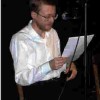
I'm a freelance translator English, French and German to Dutch since more than 20 years. My main fields are automotive, it, tourism and marketing. There are some big car manufacturers amongst my clients. Don't hesitate to contact me for more info.
Ik ben al meer dan 20 jaar freelance vertaler Engels, Frans en Duits naar Nederlands. Mijn specialiteiten zijn de auto-industrie, it, toerisme en marketing. Enkele van mijn klanten zijn grote autofabrikanten. Aarzel niet om info te vragen
This profile is from a federated server and may be incomplete. View on remote instance
